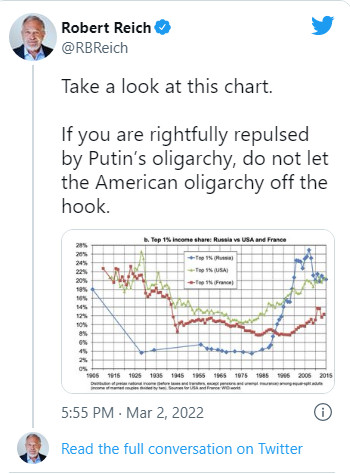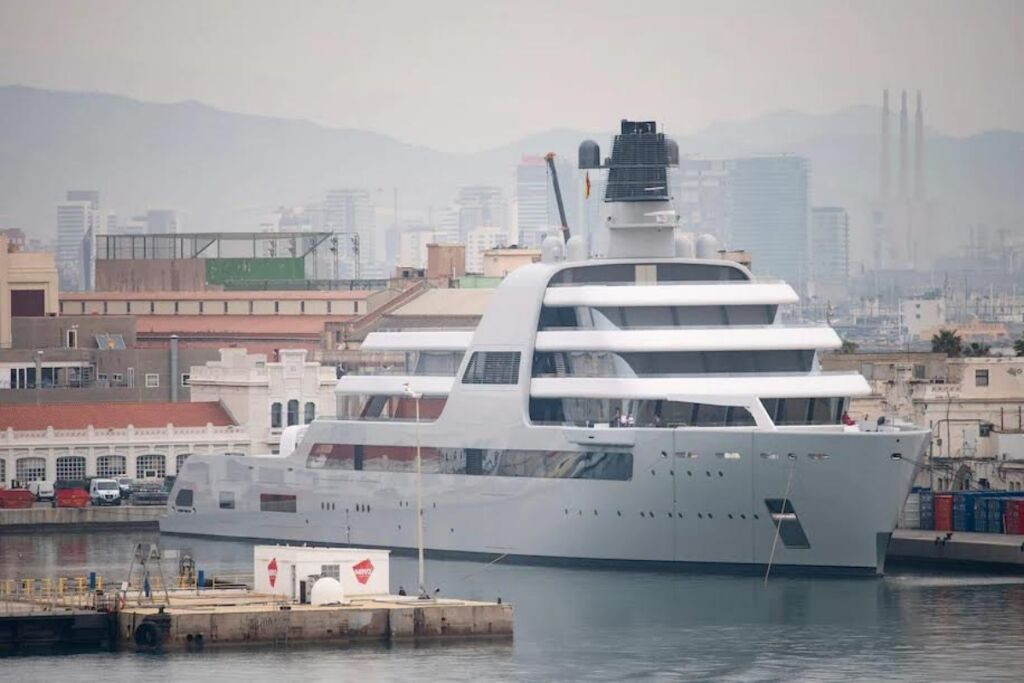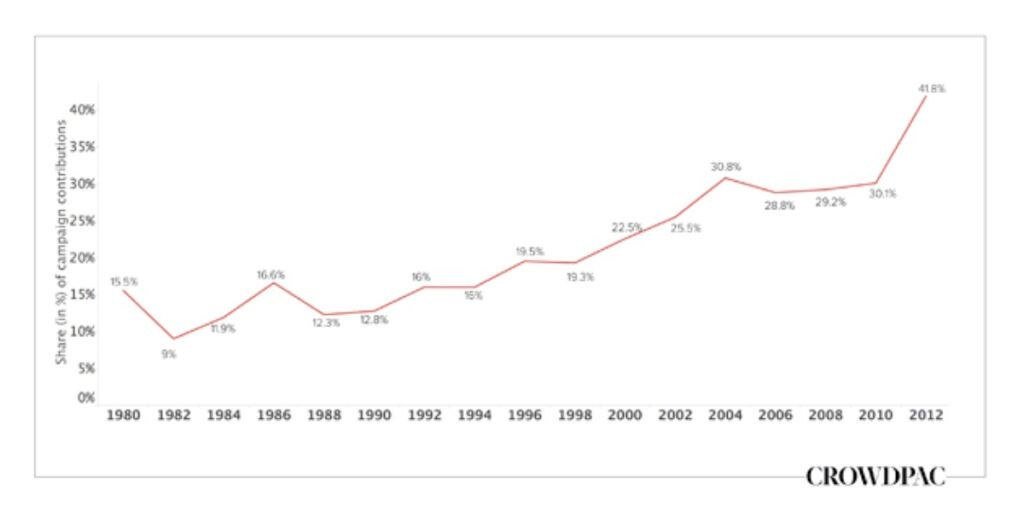
Date: 2024-12-21 Page is: DBtxt003.php txt00021860
GROSS INEQUALITY
ROLE OF OLIGARCHS
LA Progressives ... Are Russian and American Oligarchs Different?
ROLE OF OLIGARCHS
LA Progressives ... Are Russian and American Oligarchs Different?

Original article: https://www.laprogressive.com/american-oligarchs/
Burgess COMMENTARY
The international initiatives to sanction Russian oligarchs because of the Putin driven invasion of Ukraine is important not only in the context of the Ukraine situation, but more broadly because it shines some light on the role that oligarchs generally are doing damage to society as a whole.
It is now quite fashionable to go after Russian oligarchs, but they represent only a small proportion of the world population of oligarchs ... with the majority located in the capitalist free world. In total the wealth of Russian oligarchs is quite modest compared to oligarchs outside Russia.
Some might argue that this simply is a result of the high performance of the economies of the capitalist free world and is simply a reward for work well done. I do not find this at all convincing. My experience suggests that almost all rapid wealth accumulation has an element of economic abuse that is a critical enabler ... and many of the safeguards that are thought to exist and easliy circumvented by professional advisors who specialize in these matters.
It would be a good outome for not only the Russian oligarchs to be constrained but for there to be massively improved accountability for all oligarchs who operate mainly in their own greedy interest.
Peter Burgess
Actually, not all that much. Which means it’s really hard for sanctions to stick
We’re sanctioning Russian oligarchs up the wazoo, hoping it’s a way to get Putin to stop his deadly attack on Ukraine. But for this tactic to work (1) the U.S. and our allies must be able to locate and tie up Russian oligarchic wealth, and (2) Russian oligarchs must have enough power to stop Putin. Let’s take them one at a time:
Can we locate and tie up the wealth of Russian oligarchs?
Anecdotally, sanctions on the oligarchs appear to be working. Last Sunday, billionaire industrialist Oleg Deripaska (on the U.S. sanctions list) and banker Mikhail Fridman (on the EU’s) both publicly urged an end to Putin’s war. Billionaire businessman Roman Abramovich has put his British soccer club up for sale and vowed to donate the proceeds to “all victims of the war in Ukraine.” Banker and entrepreneur Oleg Tinkov told his 634,000 Instagram followers last week that “innocent people are dying in Ukraine now, every day, this is unthinkable and unacceptable.”
But are these sanctions really biting? This is where a comparison of Russian oligarchs with American oligarchs comes in.

While Russian oligarchs (Russia’s richest 0.01 percent) have hidden an estimated $200 billion offshore (over half of their financial wealth), American oligarchs — America’s 765 billionaires — have hidden $1.2 trillion (about 4 percent of their wealth), mostly to avoid paying taxes on it.
While American oligarchs park their income and wealth in tax havens such as the Cayman Islands, Russian oligarchs have hidden their most valuable assets in the United States and Europe. The reason they do so is telling: Western democracies follow the rule of law. Under such laws, before a government can seize property it must follow lengthy and elaborate legal processes. As a result, American and European governments are finding their hands tied in actually taking control of the assets of Russian oligarchs.
American law makes it difficult even to discover what Russian oligarchs own in the United States because they’ve hidden their assets behind complex trusts and shell corporations. American laws governing taxes, corporations, transportation, and banking are wonderfully convenient for the world’s oligarchs. One out of every six aircraft in the United States, for example, is registered through trusts, Delaware corporations, and even post office box addresses, making it almost impossible to discover their true owners.
This isn’t an argument against sanctioning Russian oligarchs. It’s just that we need to be clear-eyed about how difficult it is to do so.
Russian Oligarchs

Russian oligarch Roman Abramovich’s yacht

Russian oligarch Roman Abramovich’s yacht
American Oligarchs

American billionaire Rick Caruso’s yacht

American billionaire Rick Caruso’s yacht
Do Russia’s oligarchs have enough political clout in Russia to stop Putin’s aggression, or perhaps even depose him?
American Oligarchs
American oligarchs have enormous political clout. In the 2012 presidential election (the most recent for which we have detailed data on individual contributions), the richest 0.01 percent of Americans (that is, the richest 1 percent of the richest 1 percent) accounted for 40 percent of all campaign contributions. (See the graph below.)

What have American oligarchs got out of these campaign contributions? The lowest tax rates on the highest incomes in over a generation — and the lowest among all wealthy nations. They’ve also gotten an IRS so starved of resources it’s barely able to enforce the law.
Russian oligarchs who have pledged loyalty to Putin arguably have less political power in Russia than do American oligarchs in the U.S. In Putin’s Russia, power is exercised by a narrow circle of officials and generals appointed by Putin, whom he has drawn largely from the former KGB. According to several Russian specialists I’ve spoken with over the last few days, this circle has become very small in recent months, now numbering perhaps a half dozen.
What is Oligarchy? | Robert Reich
We should use whatever means at our disposal to make Vladimir Putin end the brutal war he started. But it is proving difficult to use sanctions on specific oligarchs to get Putin to stop. Perhaps we should be more ambitious. My Berkeley colleague Gabriel Zucman recommends that the United States and the European Union freeze all offshore holdings of Russian nationals in excess of $10 million. This would affect about 10,000 to 20,000 Russians who have benefitted the most from Putin’s rule.
Meanwhile, blanket sanctions against the Russian economy are having an effect. Over the past week they have caused the ruble to collapse and decimated Russian markets. But the major burden has fallen on ordinary Russians, many of whom have already suffered from Putin’s brutal regime.
As we’ve seen in North Korea and Iran, dictatorships don’t depend on popular approval. In fact, widespread hardship can lead to even more repression and violence. We should remind ourselves that Putin is not synonymous with the Russian people. Xenophobia of whatever form has no place in the fight against vicious authoritarianism.
Robert Reich
Crossposted with permission from Robert Reich’s Newsletter.